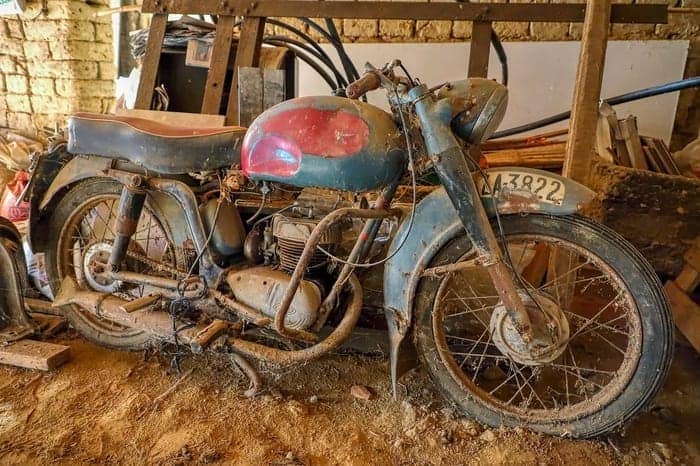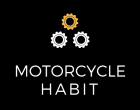
There are so many makes and models of motorcycles out there and each of them are appreciated by different types of people. Older motorcycles are particularly popular among most motorcyclists because of the appreciation they have for the vehicle’s history.
Barn finds are especially exciting to find because they can be worth a lot and may be considered almost a literal “diamond in the rough.” But, of course, there’s always the legality of owning a barn find which includes getting it titled.
How do you title a barn find motorcycle? To title a barn find motorcycle, you’ll need to first attempt to find the previous owner. If you’re unable to do that, perform a VIN inspection to ensure it is not stolen or has a lien on it. If the VIN shows to be clean, you may apply for a new title to be generated accompanied by a bill of sale.
Titling a barn find motorcycle may seem a little tricky, but if it doesn’t have a negative history you should be able to do it just fine. I have successfully titled barn find motorcycles before and this article will explain exactly how you can do it, too.
Titling A Barn Find Motorcycle
There are several situations an individual can be presented with when it comes to barn finds. Whether you contact someone who found a barn find or you simply found one yourself, there are a few steps that should be taken in order to legally own it if that’s what you wish to do.
Most states didn’t start titling motorcycles (or vehicles in general) until a certain year. There are a lot of vehicles that were manufactured before that year which means there’s a lot of vehicles out there that never came with a title.
Barn finds usually fall under this category which is why this situation becomes a little more tricky. Titles were made initially to prove the ownership of the motorcycle; getting a new title when you weren’t the original owner that bought it before titles even came out is an obstacle for many.
Normally I recommend to never buy a motorcycle without a title, but barn finds are one of the few exceptions because of the different circumstances. If you have found someone who is selling a barn find that you can’t pass up, it’s okay to proceed with the transaction as long as you do it in the right steps.
First, contact the seller and get as much information about the motorcycle as possible. They may not have a lot of information to give because it is, well, a barn find. You and the seller should attempt to contact the original owner if possible. You can do this by taking the VIN into the DMV and see if they can provide any contact information.
If finding the original owner is a dead end, perform a thorough VIN inspection before buying the motorcycle to ensure it isn’t stolen or that it doesn’t have a lien on it. You can do a basic VIN inspection on a few online platforms, but those may not be very reliable. You can also do a VIN inspection by calling your car insurance and having them run the number for you.
The very best way to perform an VIN inspection and get the best and most honest results is having your local DMV do it for you. You’ll need to make an agreement with the seller to meet them at the DMV with the motorcycle so a worker can come out and physically see the VIN.
I’ve also had a bit of luck calling the local police department and having a policeman come out to my place and perform the VIN inspection there. There aren’t any promises going this route, but if you mention the type of barn find you have and you happen to be talking to a policeman who’s is a motorcycle enthusiast, you may get lucky.
If the VIN comes back saying the motorcycle is either stolen or has a lien on it, you’re out of luck and there’s pretty much no way you can own the motorcycle (unless you’re willing to pay off the lien). But if the VIN comes clean, you may proceed with the transaction and are okay to buy it from the seller.
Once you have purchased the motorcycle, get it titled before you do any work on it. You can do this by going to your local DMV and providing them with your proof of residency, the bill of sale from the seller, fill out a new title application, and pay a fee (both for taxes and for a new title application).
The DMV will have to perform another VIN inspection since that’s simply their protocol when registering a new vehicle. But since you’ve already done a VIN inspection, you don’t need to worry about any problems arising. Once you fill out a new title application, register it, and complete the VIN inspection, the DMV will send in the paperwork and your state will generate a new title. This will be mailed to you within the next few weeks.
An important piece of paper that’s required to title a barn find is a bill of sale. What if you happen to discover this barn find yourself and want to title it and keep it as your own? You can’t fill out a bill of sale yourself.
If this is your case, you’ll need to document the attempts you made in finding or contacting the original owner. After a reasonable amount of attempts for contact with no response, you can then present that to the DMV who may deem this as enough evidence that the motorcycle is abandoned. You will then proceed with the same steps previously stated and fill out a new title application, do a VIN inspection, and pay the appropriate fees.
What Is Considered A “Barn Find?”
We all have heard the term “barn find,” and generally get an idea of what that means from the name, but is there an actual definition for it? Yes, in fact, there is.
Barn finds are motorcycles that have been discovered after being stored for decades. The term was created because of the tendency of finding a motorcycle in a barn, shed, or other outside buildings in which you wouldn’t expect to find one.
Since barn finds are stored in such unidealistic situations for decades, they usually haven’t had a title generated if they were made before the U.S. started requiring titles. States generally started generating titles for vehicles in the late 60’s and early 70’s (each state’s year is different).
Why A Title Is Important For Old Motorcycles
Titles are essential in proving ownership of a motorcycle no matter how old the motorcycle is. If you have found yourself a barn find, you need to title it to ensure you are compliant with your state’s laws.
Having an untitled barn find without doing a proper VIN inspection means you could possibly have a stolen motorcycle or you possess a motorcycle that still has a lien on it. This means that if the state somehow finds out you possess it, it could be confiscated. Having to live with that fear isn’t worth it.
If you ever plan on fixing it up and riding it, you’ll have to register it which also requires a title. It’s a crime (socially) to have such a beautiful and historic machine and not let anyone see it.
A Few Things To Should Be Cautious Of
While it is completely possible to title a barn find with minimal problems, there are a few things you should be cautious of, especially if you’re planning on buying one from a private seller.
Be wary if the seller isn’t willing to let you perform a VIN check. A VIN check should always be done before actually buying a barn find motorcycle. If the seller won’t let you do that, move on to something else because chances are they are trying to hide something.
Second, be mindful of specific information the seller may tell you about the motorcycle barn find. It can sometimes be hard to identify certain characteristics of a barn find because of the usual rough condition they’re in. VINs are useful for more than just identifying whether or not it’s stolen, they’re also good for identifying the year it was made, where it was made, original color, and other helpful data that could prove the seller wrong.
Because buying a barn find motorcycle often means buying a motorcycle without a title, you need to be particularly cautious so you don’t find yourself in a world of mess down the road. Be sure to do it right so you can legally enjoy your historic machine and show it off to the world.
I have created an entire video series about restoring motorcycles from start to finish. Within this series you’ll find tips and tricks you won’t find anywhere else online as well as tutorials on hard-to-tackle components such as carb rebuilds, electrical, and body work. Click here for more information if you’re interested in restoring or building your dream motorcycle from that barn find!

